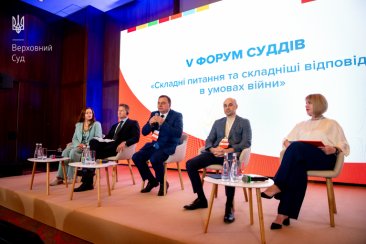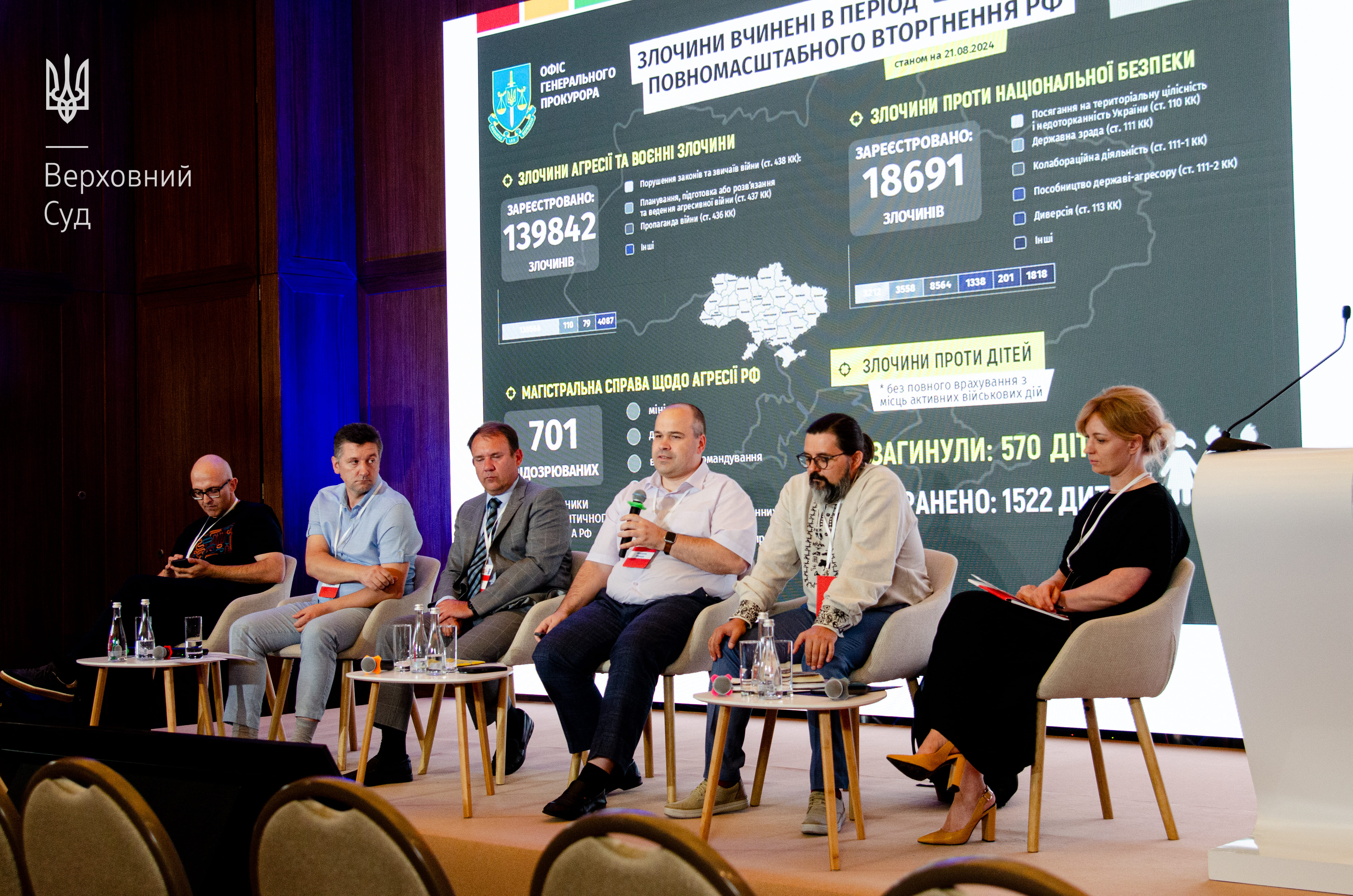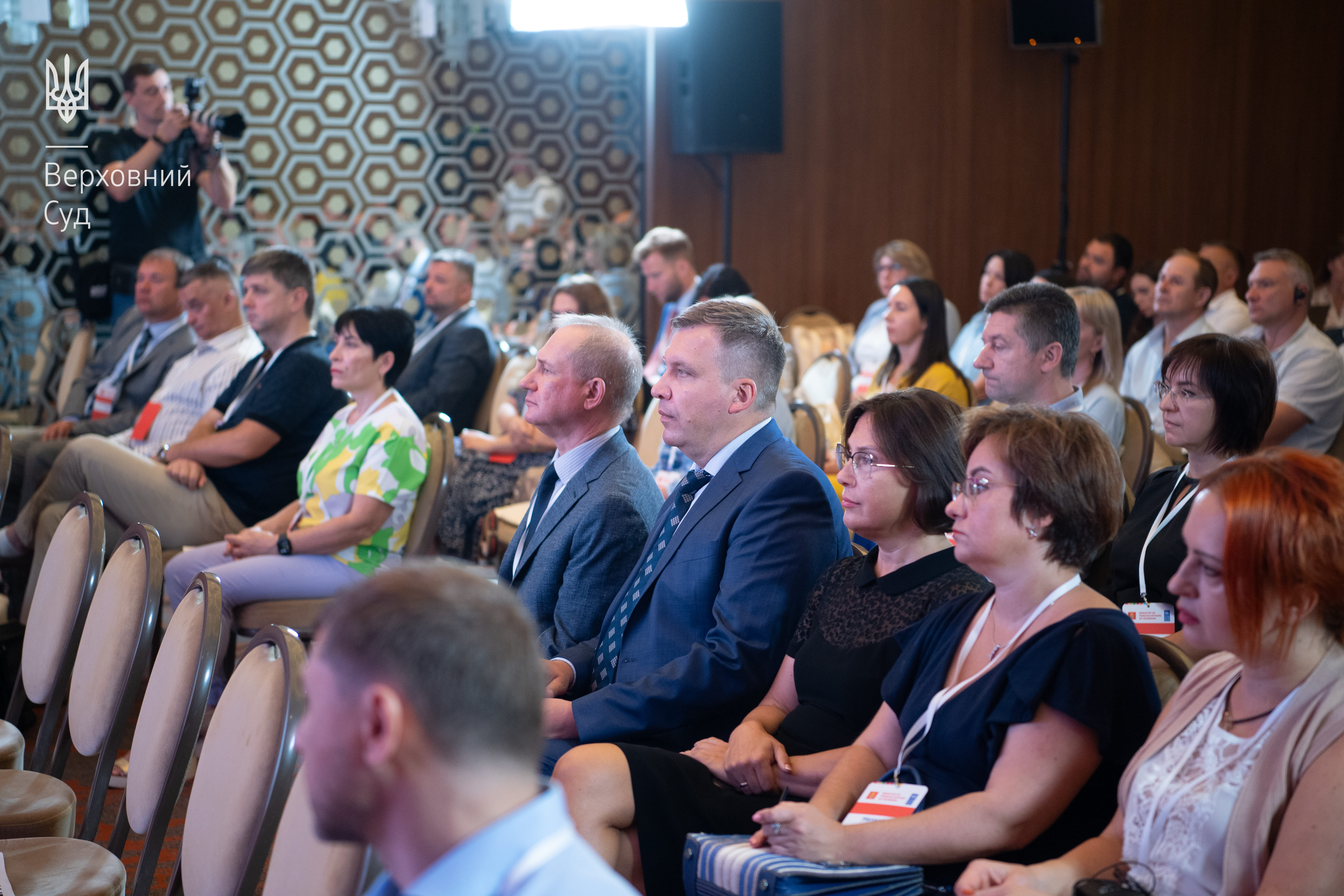Contact center of the Ukrainian Judiciary 044 207-35-46

In order to discuss the development of the future, we need to understand the challenges we face today, what we are doing well, what needs to be improved, and which issues remain challenging for us.
This was stated by Stanislav Kravchenko, President of the Supreme Court, during the V Judicial Forum ‘Complex Questions and More Complex Answers in Time of War’, organised by the United Nations Development Programme (UNDP) in Ukraine with financial support from the Government of Denmark.
The President of the Supreme Court emphasised that the United Nations, the Government and the people of Denmark are long-standing reliable partners of Ukraine. And if earlier this long-term partnership took place in the context of the establishment of our state, in today's realities, the assistance and support from Denmark is truly invaluable for us.
Among the challenges facing the judiciary today, Stanislav Kravchenko highlighted, first of all, the change in the territorial jurisdiction of a number of courts and the logistical difficulties associated with it, the increased workload of courts, the receipt of new categories of war-related cases, as well as the need to ensure the operation of courts in frontline areas, the resumption of courts in de-occupied settlements, judicial control at the stage of investigation of war crimes and consideration of relevant criminal proceedings.
.jpg)
The SC President pointed to the persistence of problems that arose even before the outbreak of full-scale war. In particular, there is an acute shortage of personnel in the judicial system. At the same time, Stanislav Kravchenko noted an important recent event in the formation of the judicial corps of local courts, namely the swearing in of 248 newly appointed judges.
In addition, the SC President said that in 2023, the courts of Ukraine considered almost 4.3 million proceedings. According to him, this result was achieved, among other things, due to the legislative regulation of certain issues, in particular, e-justice.
Stanislav Kravchenko also stated that the Supreme Court is actively developing the practice of considering new categories of cases by applying international law, as certain provisions of the Criminal Code of Ukraine are blanket and without applying, in particular, the Geneva Conventions, it is impossible to formulate the indictment and, in fact, to consider criminal proceedings.
According to Serhii Martiev, Judge of the Grand Chamber of the Supreme Court, it is difficult to overestimate the role of the judiciary in the development of the national model of transitional justice. He noted that the basic principles and mechanisms for restoring the rights of individuals (restitution, compensation, satisfaction, etc.) are regulated by the UN General Assembly Resolution of 16 December 2005. Ukraine has not yet established a special pre-trial body responsible for the functioning of these mechanisms for the restoration of violated rights, so the implementation of transitional justice currently relies solely on the judicial system.
In the context of transitional justice, according to the speaker, the main tasks of the judiciary are:
- ensuring unimpeded access to justice for citizens, including through the use of digital technologies;
- impartial and unbiased consideration of cases related to compensation for war victims;
- punishment of those involved in war crimes;
- maximum observance of human rights and fundamental freedoms.
A significant achievement of the judiciary at this stage is that it has found a way to resolve the issue of compensation for moral and property damage caused by the war in the absence of appropriate legislative regulation. In this context, the judge recalled the resolutions of the Grand Chamber of the Supreme Court of 4 September 2019 in case No. 265/6582/16-ц and of 12 May 2022 in case No. 635/6172/17. In these resolutions, the Supreme Court stated that the absence of provisions in Ukrainian legislation on compensation to the owner for damage caused by a terrorist act does not prevent a person from being compensated for damage or ensuring just satisfaction. In addition, the judiciary has dealt with the issue of overcoming the judicial immunity of the aggressor state.
.jpg)
Olha Stupak, Judge of the Grand Chamber of the Supreme Court, recalled that after the beginning of Russia's armed aggression against Ukraine in 2014, national courts were faced with considering atypical cases of compensation for damage caused by destruction, loss of property, etc. The first claims for compensation for damage caused by the war were directed to the state of Ukraine. This was a significant challenge for the judicial system.
'In its resolution of 4 September 2019 in case No. 265/6582/16-ц, the Grand Chamber of the Supreme Court concluded that the state of Ukraine cannot compensate for damage caused by a terrorist act, as there is no relevant legal mechanism. The European Court of Human Rights also agreed with these conclusions in the case of Futornyak v. Ukraine,’ the judge said.
Many atypical cases concerned the determination of the facts of birth and death in the temporarily occupied territories, but now the practice in this category of disputes is well established due to the application of the "Namibian exceptions". Olha Stupak added that there are still controversial issues regarding the recognition of a person as missing or declared dead, as well as the consideration of cases of compensation for damage where the aggressor state is the defendant.
According to the speaker, now that the International Register of Damage caused by the aggression of the Russian Federation against Ukraine has been established, the decisions of national courts in cases of compensation for damages in which the aggressor country is the defendant can complement the future international mechanism of compensation for damage. The motivation and reasonableness of such decisions of Ukrainian courts and compliance with the standards of evidence are the key to the recognition of the legitimacy and high quality of these court decisions at the international level.
Yevhen Petrov, Supreme Court Judge of the Civil Cassation Court, focused on the specifics of compensation for property damage in times of war. He pointed out that the problem of solving cases of compensation for property damage caused as a result of the armed aggression of the Russian Federation against Ukraine consists, in particular, in finding answers to the following questions: how to determine the amount of damage and the value of destroyed or damaged property, who should compensate for it and what should be the amount of compensation. It should be noted that the Supreme Court's case law on compensation for breach of a positive obligation by Ukraine has changed radically since 2022.
Yevhen Petrov is convinced that when considering such disputes, the courts should look first and foremost to international law and principles, as Ukrainian law has no experience in regulating issues related to compensation for damage caused by war. "In each case, the courts must establish a causal link between the actions of the aggressor country and the damage caused. In addition, it is necessary to clearly define the standards of proof in such cases, which will correspond to the full implementation of the principle of the adversarial and dispositive judicial process, including finding ways to notify the Russian Federation as a defendant in these cases. As for the latter, this may certainly be perceived negatively, but we must understand that from the point of view of European justice, a party cannot be deprived of the right to representation and defence, no matter what," the judge concluded.
Nataliia Sakara, Supreme Court Judge of the Civil Cassation Court, focused on procedural issues in war-related cases. In particular, she said that during the war, the question arose as to which facts could be established in court and which could not. Currently, the Supreme Court's position is that the facts of displacement of a person as a result of armed aggression and the fact of death as a result of armed aggression on the territory of Ukraine can be established in court. However, according to current case law, the fact that a person is excluded from military registration and the fact that a person is not liable for military service cannot be established in court.

Regarding jurisdiction in cases involving internally displaced persons, Nataliia Sakara said that under the provisions of the Civil Procedural Code of Ukraine, jurisdiction is determined by the registered place of residence of the person. If a person was forced to leave his or her place of residence as a result of an armed conflict or temporary occupation and was registered as an internally displaced person, he or she files a lawsuit in the court of the place of registration as an internally displaced person. In this regard, the judge cited the decision of the Joint Chamber of the Civil Cassation Court of the Supreme Court of 24 June 2024 in case no. 554/7669/21.
Regarding the specifics of notifying, inter alia, persons in the temporarily occupied territories or in the combat zone, the judge noted that they can be notified by placing an announcement on the official website "Judiciary of Ukraine". She also spoke about the resolution of the Grand Chamber of the Supreme Court of 10 April 2024 in case No. 454/1883/22, which summarises that sending procedural documents to the e-mail address of the party to the case indicated in the documents submitted to the court is not prohibited, but can be done only as an additional step.
Semen Stetsenko, Supreme Court Judge of the Administrative Cassation Court, highlighted the issues related to the protection of the rights of veterans and family members of fallen soldiers. He said that according to the Ministry of Veterans' Affairs of Ukraine, as of 25 July 2024, 1.3 million citizens have the status of veterans. And this large number will continue to grow. Therefore, the issue of protecting the rights of veterans is extremely relevant.
The judge drew attention to the difference between the legislative definition of the status of veteran and the public understanding of this concept as only a war veteran. Translated from Latin, the word "veteran" means "an experienced warrior who has participated in many battles". According to Semen Stetsenko, it is necessary to define the term 'veteran' more clearly in legislation and to distinguish between different categories of veterans.
"Social security for veterans should be aimed at a new volunteer policy; adoption of an updated law on the status of veterans; ensuring real, not just declared, access to social and legal guarantees of the state for veterans and family members of fallen soldiers," the speaker said. In addition, he spoke about the exemplary decision of the Administrative Cassation Court of the Supreme Court of 5 March 2024 in case No. 440/14216/23, which was an appeal against the actions of the pension authorities regarding the payment of an annual lump sum to persons with disabilities as a result of war (war veterans).

Vasyl Krat, Supreme Court judge at the Civil Cassation Court, spoke about requisitioning under martial law. According to the Supreme Court's case law (Resolution of the Civil Cassation Court of the Supreme Court of 8 August 2018 in case No. 284/276/16-ц), requisition means the compulsory paid alienation of property by the state from the owner in extraordinary circumstances on the basis and in accordance with the procedure established by law, subject to prior and full compensation of its value or without it.
Since requisition is used in exceptional circumstances requiring immediate action, it is carried out extrajudicially (administratively) by a decision of the state authorities. The administrative procedure for requisitioning property from the owner is based on the need for a rapid response by the authorities to emergency circumstances.
Moreover, as the judge noted, the rules on requisition are aimed at resolving a conflict between the public interest and civil law (in particular, property rights and other civil rights), which is resolved in favour of the public interest.
The requisition is both a ground for termination (para. 9, part 1, Article 346 of the Civil Code of Ukraine) and for acquisition of property. Moreover, as a ground for acquiring property rights, it can only be used by the state, which excludes the possibility of requisition by local authorities. Since only the will of the acquirer of the property (the state) is taken into account in requisition, it is one of the original ways of acquiring rights. The legal consequence of requisition is the transfer of the requisitioned property to the state or its destruction.
The analysis of Article 353 of the Civil Code of Ukraine provides for two types of requisition depending on the grounds for requisition:
a) requisition under extraordinary circumstances (part 1, Article 353 of the Civil Code of Ukraine);
b) requisition under martial law or a state of emergency (part 2, Article 353 of the Civil Code of Ukraine).
The speaker explained that the difference between the two types of requisition lies in the moment of compensation for the value of the property. In the case of requisition under extraordinary circumstances, compensation must be made before the expropriation of property, and in the case of requisition under martial law or a state of emergency, the state's obligation to compensate the value of property occurs after its expropriation.
According to the judge, the right to demand the return of property depends on the status of the "former" owner, and the return of property is possible, in particular, when the emergency circumstances cease to exist (resolution of the Civil Cassation Court of the Supreme Court of 13 September 2023, case No. 707/1298/22).
In this context, Vasyl Krat focused on the decision of the Civil Cassation Court of the Supreme Court of Ukraine of 5 June 2024 in case No. 712/3525/23, which dealt with the question of whether it is possible to reclaim requisitioned property in favour of the former owner before the end of the legal regime of martial law. This case has now been referred to the Grand Chamber of the Supreme Court.
Mykola Mazur, Judge of the Grand Chamber of the Supreme Court, spoke about the path from liability for war crimes against property to compensation for the damage caused. In particular, he said that since 2022 there has been a steady trend towards an increase in the number of decisions rendered in absentia, i.e. in the absence of the accused. As for the types of war crimes, since 2022, the most frequent convictions are for ill-treatment and appropriation of property under Article 438 of the Criminal Code of Ukraine.
Mykola Mazur also mentioned the achievement - Ukraine's ratification of the Rome Statute of the International Criminal Court. This will allow to refer to Article 8 of the Statute in the decisions of national courts, which will ensure, among other things, the unity of case law. However, the ratification of the Statute comes into force after the adoption of the implementing law. According to the speaker, such a law does not provide for a change in the disposition of Article 438 of the Criminal Code of Ukraine. It will only change its name.
The speaker also explained that one of the main challenges facing the Ukrainian judiciary in the future is the realistic prospect that not all perpetrators of war crimes will be identified and convicted. Moreover, it should be borne in mind that the consideration of war-related cases under the in absentia procedure creates an additional probability of further review of the relevant judgments of Ukrainian courts by the ECHR. Difficulties will also arise in practice at the stage of enforcement of court decisions in war-related cases. According to Mykola Mazur, the future compensation mechanism may help in this situation.